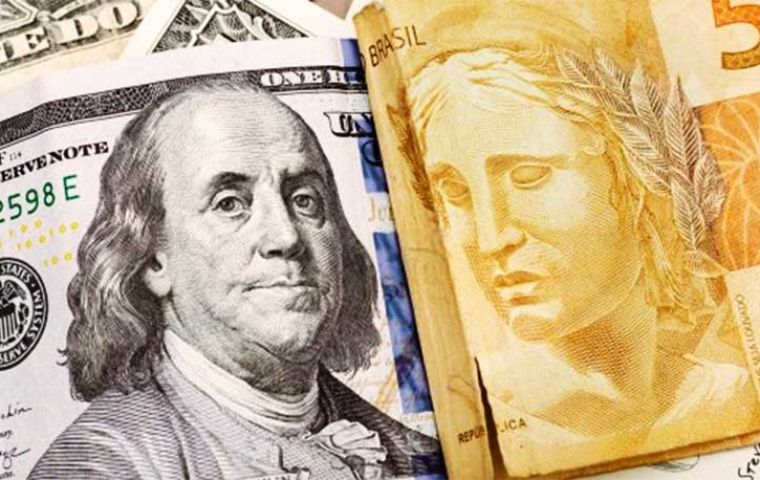MercoPress. South Atlantic News Agency
Brazil's massive goods foreign trade is in US dollars but there are incipient deals in Euros and Reais
 In 2023, the US dollar maintained its dominance in Brazilian goods exports, totaling US$ 325.5 billion (95.84% of the total), with an 1.8% increase compared to 2022
In 2023, the US dollar maintained its dominance in Brazilian goods exports, totaling US$ 325.5 billion (95.84% of the total), with an 1.8% increase compared to 2022 Brazil's foreign trade in goods, some US$ 640bn annually is done mostly in US dollars, some 95%, but there are some inroads to other currencies such as the Euro and its own Brazilian Reais. These figure come from an annual report on trade operations’ currency statements compiled by Brazil’s Foreign Trade Secretariat of the Ministry of Development, Industry, Trade, and Services (Secex-MDIC), and revealed last week.
In the case of Reais, they refer mostly to sales to Mercosur trade partners such as Argentina and Paraguay, mainly manufactured goods, and usually tied to generous financial schemes supported by Brazil's Development and Social Bank, BNDES..
The European Union emerged as the second-largest destination for exports in Brazilian-issued currency, accounting for 15.6% of the total. Simultaneously, it remains the top destination for exports traded in Euros, comprising 61.5% of the total.
The report also indicated that in 2023, the US dollar maintained its dominance in exports, totaling US$ 325.5 billion (95.84% of the total), with an 1.8% increase compared to 2022 overall. Meanwhile, exports in Euros reached US$ 8.4 billion, a 0.9% decrease from 2022, and sales traded in Brazilian reais amounted to US$ 4.5 billion (a 9.3% decrease). Among other currencies, the British pound reached US$ 452 million (+17.2%), and the Yen reached US$ 225 million (+8.9%).
Secex highlights that nearly all trade declared in Reais pertains to the manufacturing sector: 94% in exports and 99.4% in imports. The Euro exhibits a similar trend: 81.4% in exports and 98.3% in imports.
Regarding Brazilian imports using the Real grew by 11% in 2023 compared to the previous year, reaching a record US$ 17.3 billion in purchases declared in Brazilian currency.
Last year also saw an increase in imports in Euros, rising by 9.2% over 2022 to total US$ 23.3 billion. However, operations declared in dollars fell by 15.7%. Nevertheless, the US currency still accounts for 80% of import operations, equivalent to almost US$ 200 billion.
Among other currencies amongst imports, notable declines were seen for the yen (Japan) and the yuan (China), with decreases of 6.7% and 17.1%, respectively.
According to information from the Foreign Trade Secretariat (Secex), several factors influence the choice of currency used in international trade transactions. One such factor lies in companies’ practice of setting prices in the same currency as their competitors to avoid exchange rate fluctuations.
Additionally, exporters reliant on imported inputs may opt to use the same currency for their revenues and production costs as a currency hedging strategy.
The predominance of the dollar is due to the fact that most commodities have their reference prices set internationally, typically in dollars. Specifically, high levels of imports in reais are associated with the use of the Brazilian currency in government purchases of imported medicines, where the public sector sets a maximum price in Reais for such transactions.
For compiling foreign trade statistics and Brazil’s trade balance, transactions declared in currencies other than the US dollar are always converted into their equivalent in US dollars. However, exporters or importers can choose whichever currency they prefer for their operations.
Since the start of the data series in 1997, operations in currencies other than the US dollar have been recorded. The declared currency reflects the choice of a currency for value fixing in the negotiation of goods and customs valuation.
It’s important to note that the currency declared in the commercial operation, also known as the denomination currency, is not necessarily the same as that used for payment and receipt of foreign exchange, as foreign exchange contracts are not linked to export and import operations. The currencies chosen for foreign exchange contracts are recorded in other systems managed by the Central Bank, at different times and criteria from customs records.




Top Comments
Disclaimer & comment rules-

Read all commentsGreat article. Well written and full of information. Congratulations!
Mar 13th, 2024 - 10:43 am 0Commenting for this story is now closed.
If you have a Facebook account, become a fan and comment on our Facebook Page!